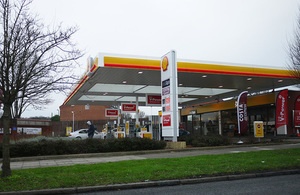 If you drive a classic, you need to read this… The Time is coming…. by Dave Moss.
If you drive a classic, you need to read this… The Time is coming…. by Dave Moss.
As predicted in these pages some time ago (especially in August/September 2016), the Department for Transport (DfT) has finally launched a consultation on whether, and how, more bioethanol content should be added to UK-supplied petrol. The unleaded fuel used by the vast majority of modern petrol cars on British roads is currently known as E5 grade, which indicates a maximum 5% bioethanol content. The DfT is currently seeking views on the introduction of a further E10 grade, containing 10% bioethanol. It’s not – at least not yet – looking to halt sales of E5 petrol, currently available in regular 95 and Premium 98 octane variations.
The DfT, in its consultation documentation, claims that filling up with E10 fuel reduces the greenhouse gas emissions of a petrol vehicle by around 2% – saying its introduction to British forecourts “Would provide significant carbon savings compared to E5.” It would also, they claim, reduce the UK’s reliance on imported fossil fuels, support UK bioethanol producers – and help to meet the UK’s climate change targets more cost-effectively,
The Government has recently (and quietly) increased those targets, for the period up to 2031, under the Renewable Transport Fuel Obligation scheme (RTFO) – which requires fuel suppliers to ensure minimum volumes of renewable fuels are sold. Though the average motorist has probably never appreciated it, these targets are mostly met by blending renewable fuels such as biodiesel and bioethanol into the regular diesel and petrol bought at British filling stations.
The DfT says the Government is keen to harness the potential benefits of introducing E10 petrol – but it acknowledges that its introduction presents some challenges, particularly in relation to compatibility with older vehicles. Its concerns focus principally on vehicles built in the 1990s and later, since the vast majority of cars sold in recent years can already use E10. There is, though, a significant number of older cars still in regular use – the DFT quotes industry estimates of around 1 million – that were never designed to cope with E10 petrol, and it seems likely a good number of earlier motorcycles will have similar compatibility issues. The Department affords a passing mention also for classic vehicles, which, unless they are survivors from the very earliest days of motoring, were never designed to accommodate any ethanol content in their fuel.
The recognition that a small proportion of older but relatively modern vehicles will need continued access to E5 petrol has led the DfT to propose and consult on the introduction of a so-called “Protection grade” fuel, guaranteeing that consumers have access to the same E5 petrol they currently use – if and when E10 is introduced. Mindful of the low volumes of pricier, Premium 98 octane E5 that is currently sold – which might tempt operators into using their pump infrastructure for the E10 regular grade, the Department says its consultation is to “Explore options for a managed transition if and when E10 fuel is introduced, to understand its impact on the UK market better, and ensure that drivers are protected if any changes come into effect.”
The consultation also includes proposals on introducing revised fuel labels at filling stations and on new vehicles, to help motorists select the right the fuel. It runs until Sunday September 16th, and includes various other questions not directly relevant to those owning and running classic cars,
However the careful wording used by the DfT relating to existing E5 fuel grades does invite speculation over quite how long availability of regular E5 petrol might continue in the UK – once E10 is introduced. Initially much will surely depend on oil company pricing strategies in a notoriously fickle market, where it’s not unknown for drivers to shop around to save 1p or 2p per litre. However with new car development running at near-breakneck speed, and modern cars already ten years old able to use E10 without adjustment, the transition period from E5 to E10 on British forecourts could prove relatively short. And if E5 volumes plummet, forecourt operators will make an obvious commercial decision, just as they did with three-star, five-star and LRP fuels in years gone by.
WHAT TO DO?
Prudent classic car owners would be wise to be mindful of the long term implications of the moves outlined in this consultation. Various actions can be taken to adapt or modify classic car fuel systems to allow operation with fuel containing ethanol; in practice, with appropriate precautions, a 5% blend should cause few problems, and a 10% blend should be manageable… but there are countries where E20 is already on sale, and at that stage, for old vehicles, things can start to get increasingly complicated.
With the UK government set on its “Road to Zero” strategy by 2040, if you haven’t already done so, now seems like a good time to be discovering what needs to be done, and how, to keep your classic running in coming years…
References and further information:
The DfT consultation closes on Sunday 16 September 2018. It can be found here. https://www.gov.uk/government/consultations/e10-petrol-consumer-protection-and-fuel-pump-labelling
The changes to the Renewable Transport Fuel obligations can be found in this document, published in September 2017: https://www.gov.uk/government/publications/renewable-transport-fuel-obligations-order-government-response
The Prospect of a “zero vehicle emissions” future was set out in the Government’s Road to Zero strategy in July 2018. Details can be found here: https://www.gov.uk/government/publications/reducing-emissions-from-road-transport-road-to-zero-strategy
The issue of problems that could arise through the addition of ethanol to the petrol used by classic vehicles has been covered in these pages before.
Kim adds, please see these links to further useful articles on this subject by Dave Moss and published on Wheels-Alive in August/September 2016:
Part One of a three instalment feature: https://www.wheels-alive.co.uk/danger-ahead-a-must-read-for-all-classic-car-owners-increasing-ethanol-content-in-petrol-threatens-major-difficulties-for-older-vehicles/
Part Two of a three instalment feature: https://www.wheels-alive.co.uk/danger-ahead-ethanol-and-classics-part-two-of-our-three-part-feature/
Part Three of a three instalment feature: https://www.wheels-alive.co.uk/ethanol-and-classics-dont-mix-our-final-episode-of-three/